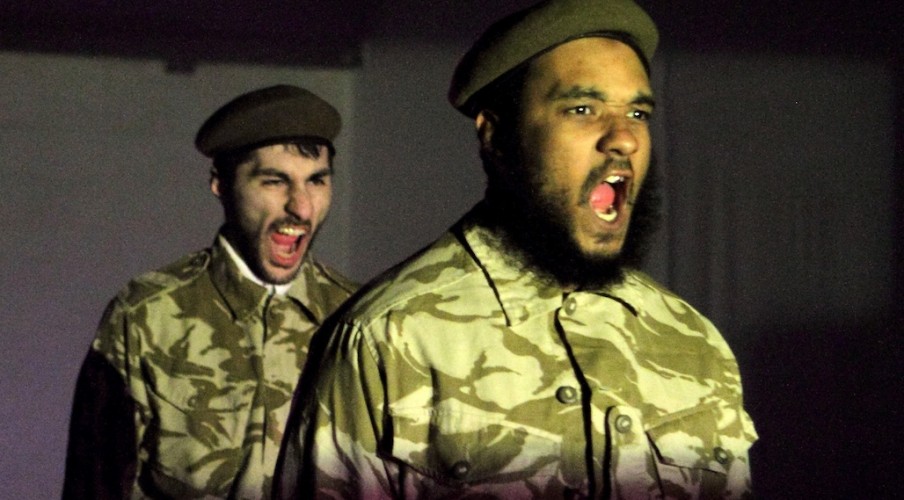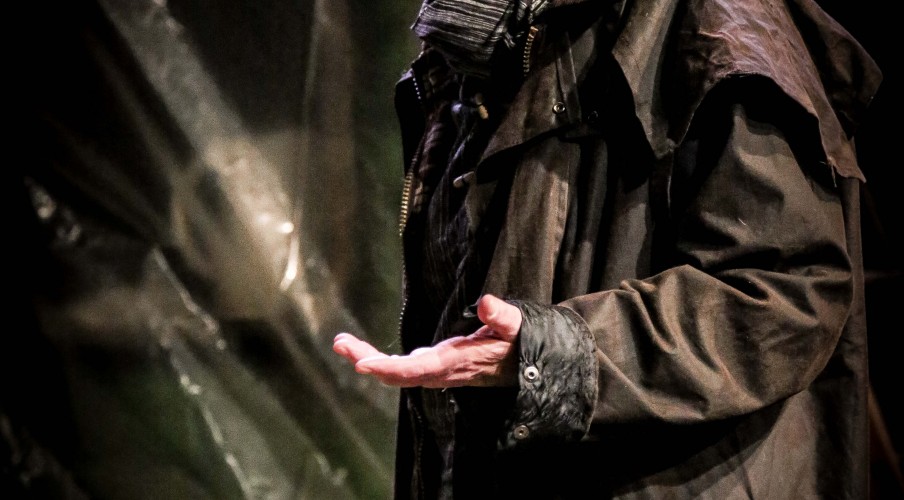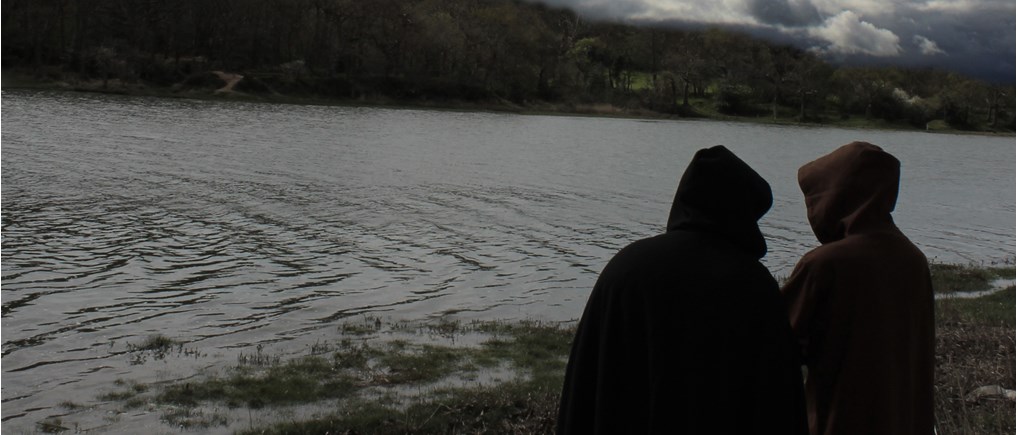Posts Tagged: Ben Musgrave
NEW COMMISSION FOR TARA ARTS
I’m very excited to say I’ve been commissioned by world-class theatre pioneers TARA ARTS to write a new play about the Indigo Revolt in 1859/60. The revolt, also known as the ‘Blue Mutiny’, erupted in Bengal in response to terrible exploitation by British Indigo planters, and also inspired the writing of one of the most devastating and effective pieces of political theatre in history. NEEL DARPAN, by Dinabondhu Mitra. The play will be a response to and conversation with that play, and explore the legacy of Indigo cultivation in Bengal today…
I grew up in Bangladesh and India, and this project feels like a return to my ‘second home’. And on that note, I’m also very proud to say that the Royal Society of Literature have awarded me a Brookleaze Grant to travel to Bangladesh and India to research the play.
2015
2015 was one of my best years yet.
It began with POLITRIX, with the amazing The Big House, a company of care leavers. In the run up to the May election, Politrix was a sort-of verbatim play about the political life of care-leavers inspired by real stories from the cast, and a surreal visit to the Houses of Parliament.
“These people who we want to listen, I don’t think we ever get to see them… these people hide.”
Directed by genius Maggie Norris, Politrix was an extraordinary experience for me. Read my reflections on the process here:
Then came ACROSS THE DARK WATER, a ‘contemporary’ historical play about the Southampton Plot to kill Henry V. It was produced by The Berry and The Point in Eastleigh, directed by the uncannily brilliant Owen Calvert-Lyons, and was performed in amazing and atmospheric locations all over Hampshire, including Portchester Castle and St Julien’s Chapel, Southampton.
I loved doing this play, with a fantastic cast and creative team. It’s really got me excited about history, and writing about history. Here’s a trailer for the play:
If you missed the live performances, the play was also filmed rather brilliantly. Here’s the first episode:
Finally, the end of the year saw the premiere of my play CRUSHED SHELLS AND MUD. Perhaps of all my plays, this is the one I love the most, and I was delighted with a fabulous, rich, brilliantly-performed and realised production, directed with visionary aplomb by Russell Bolam.
And I’m proud to say that Nick Hern Books also published the playtext.
Here’s the Crushed Shells trailer:
If you were able to make it to something this year, thank you for coming, and hope you enjoyed yourself. There’s more in the pipeline for 2016 – watch this space!
And many many thanks to all those gifted and generous people I’ve worked with this year. Too many to mention (but do please explore the other pages on the site for more about the plays and the teams behind them).
Happy new year!
Last week of Crushed Shells and Mud.
There’s only a week left to catch CRUSHED SHELLS AND MUD at the Southwark Playhouse.
I’m so proud of the show. Incredible performances by all of our astounding cast – ALEX LAWTHER, HANNAH BRITLAND, ALEXANDER ARNOLD, SIMON LENAGAN, LAURA HOWARD, CLARE ALMOND. Stunning realised by a top-notch creative team headed by the fantastic RUSSELL
Here are some of the things that have been said about the play (I’ve selected things that focus on the writing, but there’s an abundance of praise for the outstanding, award-nominated performances and production to be found elsewhere).
ACROSS THE DARK WATER
Delighted to announce that my play for The Point, Eastleigh and The Berry Theatre, ACROSS THE DARK WATER, will be performed at diverse venues between Southampton and Portsmouth from July 21st. It will be directed by Owen Calvert-Lyons, artistic director of The Point and The Berry.
More details (dates, venues, booking) here:
It’s a play about the Southampton plot to kill Henry V in the days before the invasion of France (this year is the 600th anniversary of the battle of Agincourt). It’s a fascinating story, and I’ve really got a kick out of getting my head into the distant past. It’s part of a season of work related to the Agincourt anniversary, and you can find out a lot more about this here.
Young people, theatre and POLITRIX
Politrix ended a few weeks ago after a very successful run. I’ve been thinking about the play a lot recently, and I want to write some reflections about what I’ve learned about young people and politics and theatre as a result of doing the play. We never really wrote any programme notes for it, so perhaps this post will help to tell part of the story of the play for those people who saw it, and give a tiny sense of it to those that didn’t.
The process began just before Christmas when I had cup of tea with The Big House CEO/Artistic Director Maggie Norris somewhere in Highbury. The Big House is a theatre company that works with careleavers. It has produced some of the most thrilling work I’ve seen in London, bold and passionate and beautiful and always with a kind of theatrical openness and freedom.
I’ve always felt that young people might be far more engaged and thoughtful about politics and power than we know. That there might be a massive territory of thought and feeling beyond the tiny spaces we give to young people to speak. The tiny little vox-boxes we put them in, walled-in by leading questions and mounting impatience.
At the time there was a lot of national discussion about disengagement with politics, and Russell Brand, and not voting, and the idea that ‘politicians are all the same’, and that ‘politicians can’t make a change’. Instinctively, my feeling was that politicians are not ‘all the same’, and that many of them have a great deal of integrity, and compassion, and belief, and that very often they work very hard for their constituents. And that in my lifetime I’ve often seen politics change the country, for good and for bad. So that was my starting point.
I suggested to Maggie that I’d like to do a verbatim play in the run-up to the election about the political life of care-leavers. The verbatim testimony would be drawn from the group who would eventually perform the play. I (perhaps naively) imagined that the development process for the play would take the group on a journey of discovery towards political empowerment and engagement. That by the end of the process we’d have 15 signed up activists, 15 fully-registered advocates.
A few days later I received a call from Maggie who was enthusiastic about the idea, but time was short and we’d have to start right away. The brilliant Andy Day, who wrote PHOENIX and BABYLON, was also on board.
I love being in the room at The Big House. The certain knowledge that expectations will be confounded, that things will go wrong, or right, that something or someone amazing will suddenly emerge without notice.
I think the group were disappointed by the idea that they were going to do a play about politics. They were concerned that it wouldn’t be emotional, and it wouldn’t have a story.
But that didn’t mean they didn’t have things to say about the subject – and it wasn’t long before a huge range of views were being shared – sophisticated, hilarious, confused, worrying, humane, self-interested, inspired. We talked about voting, and the overwhelming majority said they would not vote. Not only that, but there was a profound and widespread antipathy not just towards parliamentary politics but towards authority and government in general. There was sympathy for conspiratorial ideas – about elections being rigged, about a world order determined to resist change:
What has the system ever done for us?
There was also a lot of support for rejecting the imposition of parliamentary acts and statutes (‘not laws but RULES) for dropping out of the system altogether, for becoming a ‘freeman’.
I was taken aback by the gulf between my perception of the world, and the perception of many of those in the room.
Listening to some of the testimony, I was pulled in many directions. On the one hand, I worried that the care system had indeed created a generation of young people reliant on a sense of their own victimhood, a sense that the system ‘owed them a living’, and that rather than using their talents to make their way in the world, they were exhausting all their energy and ability in a struggle with a benefits system that was holding them back. On the other hand, I heard other stories that were devastating, stories about a shameful failure of the System, on many levels, to protect some of the most vulnerable people in the country.
Often the stories were not ‘newsworthy’ in any sense, but shocking because they marked the beginning of a process of alienation. The moment when these young people suddenly realised that the promise of self-realisation, of ‘being who you want to be’, had not been extended to people like them. Instead, the system had tried to institutionalise them, diagnose them with psychiatric conditions, imprison them, expel them, subject them to disproportionate police attention, classify them as too vulnerable to have a chance. One member of the group, of obviously explosive ability, was not allowed by her care team to apply for drama school on the grounds that ‘this young person has suffered rejection and abandonment all their lives, so how will she cope with rejection from a drama school?’
We had organised a trip to the Houses of Parliament. An MP with a genuine and compassionate belief in improving the lives of looked-after children had agreed to show us round. In my head, I was hoping that that this would be the beginning of a reconciliation between parliamentary politics and those profoundly alienated from it. The beginning of a process of empowerment. We gathered for a Q and A with this MP in Portcullis House. The group had brought a lot of negativity about politics into the room, but our MP was game. He was doing a good job playing the role of an MP, fingertips together, nodding, listening, Mr Public Service, playing up to it a little bit, as if the group might enjoy a little bit of parliamentary ostentation.
But then something went wrong. One of the group stood up and started to talk about rejecting the acts and statutes of parliament, of a total and revolutionary rejection of our political system. Some people in the group agreed with him, and some people did not, and things began to get heated.
And then the MP made a mistake. Under pressure from the group member who was speaking, he said:
‘With all due respect, what you’re saying is absolute tripe’.
I think he was just giving the group a delightful taste of parliamentary ding dong, but he didn’t reckon for the sensitivity of the group.
The mood in Portcullis House suddenly shifted.
That’s what they think of us.
That’s how they talk to us.
That we don’t know know what we’re talking about.
That what we’re saying is tripe.
It was a dangerous moment. It felt like anything could happen. An explosion, a riot.
There was no riot, but as we spilled under the tunnel into the Palace of Westminster for our tour, the damage had already been done, and this sense of grievance coloured the rest of a strange day in parliament, full of minor skirmishes, near-explosions, misunderstandings and mysterious wonders.
This day in parliament inspired the frame of the play, about a group of young people who visit parliament, and find themselves in a surreal battle with the heart of the ‘system’.
I love being in the room at The Big House. Acting in a Big House play is not about pretending to be someone else, it’s about honestly, openly, exploring the limits of your own self.
It’s about the bright possibility of who you could be.
The rehearsal process was joyful, frustrating, agonising, eye-opening. People dropped out. People astounded us with their extraordinary ability and resilience. The script was rewritten at the last minute, many times, and we weren’t sure that the show would be ready in time for the first night.
Towards the end of the rehearsal process, we asked the group again whether they were going to vote in the election, but nobody seemed to have changed their point of view. A few would, but I was depressed that that the group hadn’t gone on the kind of journey I had hoped they might.
The dress rehearsal was difficult – it wasn’t clear whether the show would take off that evening. We were agonisingly close to something. Maggie had done an extraordinary job, and the group had worked so hard, and come so far, and although the show hadn’t quite come into focus yet, I could see it had taken on its own reality. We had created a space in which the group could be heard.
We were eating some food together just before the first show and someone asked ‘are you going to vote, then?’, and suddenly there was a new attitude in the room:
I’m going to register to vote you know!
Yeah, I’m going to vote! Cos I don’t want to let David Cameron get back in, man!
I’m going to vote! Cos otherwise we can’t make a change!
Not everyone had shifted, but something had changed.
At the first performance, as so often happens, everything fell into place. And here they were, in front of an audience, speaking their minds, giving an account of who they were and who they wanted to be. Becoming powerful.
A few weeks later and the show’s over and we’re at the Big House watching that Ken Robinson TED talk about creativity in Education. There’s a story in there about the choreographer Gillian Lynne, about how when she was at school in the 30s they thought there was something wrong with her because she couldn’t keep still, she kept on fidgeting. But one day they realised that there wasn’t something wrong with her – she was a dancer. They sent her to dance school, and it was wonderful, she was suddenly in the right place. She was home, she was being who she wanted to be.
After watching the film, one of the group was talking about how naughty she was at school, how distracted she was, how she didn’t get on with authority.
I asked her if she had ever felt like Gillian Lynne felt the moment she arrived at her dance school, had she ever been in a place where she felt like she could be who she wanted to be?
‘Yes,’ she said.
‘Where was that?’ I asked.
‘Here,’ she said.














